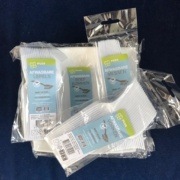What’s the deal with the Plastic Soup again?
March 15 2024 That’s what readers of news site nu.nl on their comment platform Nujij were wondering. In a recent […]
Amsterdam, 12 June 2019 – Filmed for the first time: coral eating microplastics. And they even seem to enjoy it. A marine biologist from Wageningen University and Research (WUR) has the disturbing primeur.
Coral normally feeds on plankton. In 2015, researchers discovered that stony corals are unable to distinguish between plankton and microplastics when filtering water. Analysis at the time showed that 21% of the corals investigated contained at least one microplastic. Many animals mistake plastic for food, but coral does not have eyes. Other researchers therefore made the assumption in 2017 that corals eat plastic because they like the taste. The phenomenon has now been filmed.
Coral turns out to have a preference for clean plastic above plastic that is covered by a layer of bacteria. The plastic, itself, seems to be a treat for the plankton. It seems likely that this is the result of the chemical additives in plastic. The corals ate all of the different kinds of plastic that were tested, but showed no interest in sand. The coral can’t properly process the plastic that is swallowed. It is also clear that, as a result of the growing plastic pollution, corals more regularly come into contact with plastic.
Tim Wijgerde, a marine biologist from Wageningen University, has been studying coral for years, specifically recovery and conservation of coral riffs. He has successfully filmed coral consuming various pieces of plastic. Wijgerde: “Although we already knew that corals can eat plastic, there were no clear recordings of this behaviour until now. So I set up a high-resolution camera above coral polyps in our coral lab in Wageningen, and fed the coral with pieces of plastic of about 2 millimetres. Within an hour it was evident that our coral also found the plastic very tasty. The next step will be to investigate how harmful microplastic is for the continued existence of coral.”
Watch Tim’s film, A Reef by Night and Day. The film runs for 12 minutes: The fragment alluded to above starts after 10 minutes and 40 seconds.
Also read: Plastic is making coral reefs sick
March 15 2024 That’s what readers of news site nu.nl on their comment platform Nujij were wondering. In a recent […]
The first Impact Fair is Europe’s largest Impact Experience. An interactive ‘immersive’ experience of impactful examples.
The waste-export to countries outside of the EU has been restricted The Netherlands is against a carpet ban on shipping of plastic waste.
The waste-export to countries outside of the EU has been restricted The Netherlands is against a carpet ban on shipping of plastic waste.

 Plastic in your body: emphasis on size rather than weight
Plastic in your body: emphasis on size rather than weight